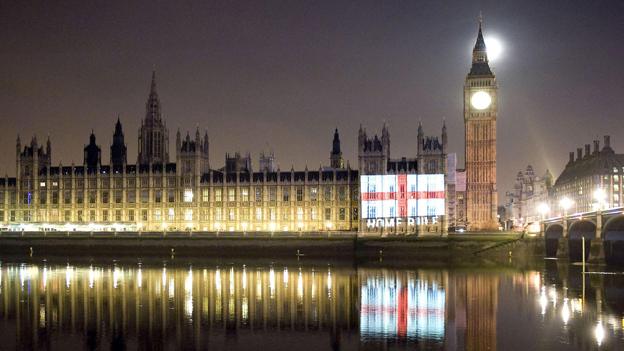What is an English law?
- Published
- comments

April 2014 protest to demand an end to non-English MPs voting on English laws
It all sounds so straightforward - only English MPs should vote on matters that affect only England.
But defining an English law is far from easy. For a start, any law that involves government departments spending extra money in England, or which reduces the amount of money spent in England, will have a knock-on impact on how much money other parts of the United Kingdom receive under the Barnett formula - the system for allocating Treasury funds to devolved administrations.
How much Scotland receives for, say, health spending is dependent upon how much is spent on health in England. The precise amount is worked out on the basis of the populations of each nation as a proportion of the total UK population.
One can see, then, why Scottish, Welsh or Northern Irish MPs will argue that any law involving additional or reduced departmental expenditure in England affects the whole of the UK. Cuts to public spending in England will have a direct effect on money available for spending in Scotland, Wales and Northern Ireland.
As well as what is called "territorially identifiable" spending, money that is clearly spent in different parts of the UK, there is spending on matters that benefit the whole country - for instance, defence and foreign affairs. This expenditure is not included in the sums to work out how much Scotland and other nations should get.
But defining UK-wide expenditure is also controversial. In 2007, the Treasury decided that spending on the 2012 London Olympics was UK-wide rather than being just for England - even though it included substantial sums for the regeneration of parts of East London. It is a decision that still rankles with the devolved administrations.
Even if (and it is a very big "if") the Westminster parties can agree on a system that would increase the involvement of English MPs in the passage of legislation affecting only England, there is likely to be huge argument as to what 'only England means'.